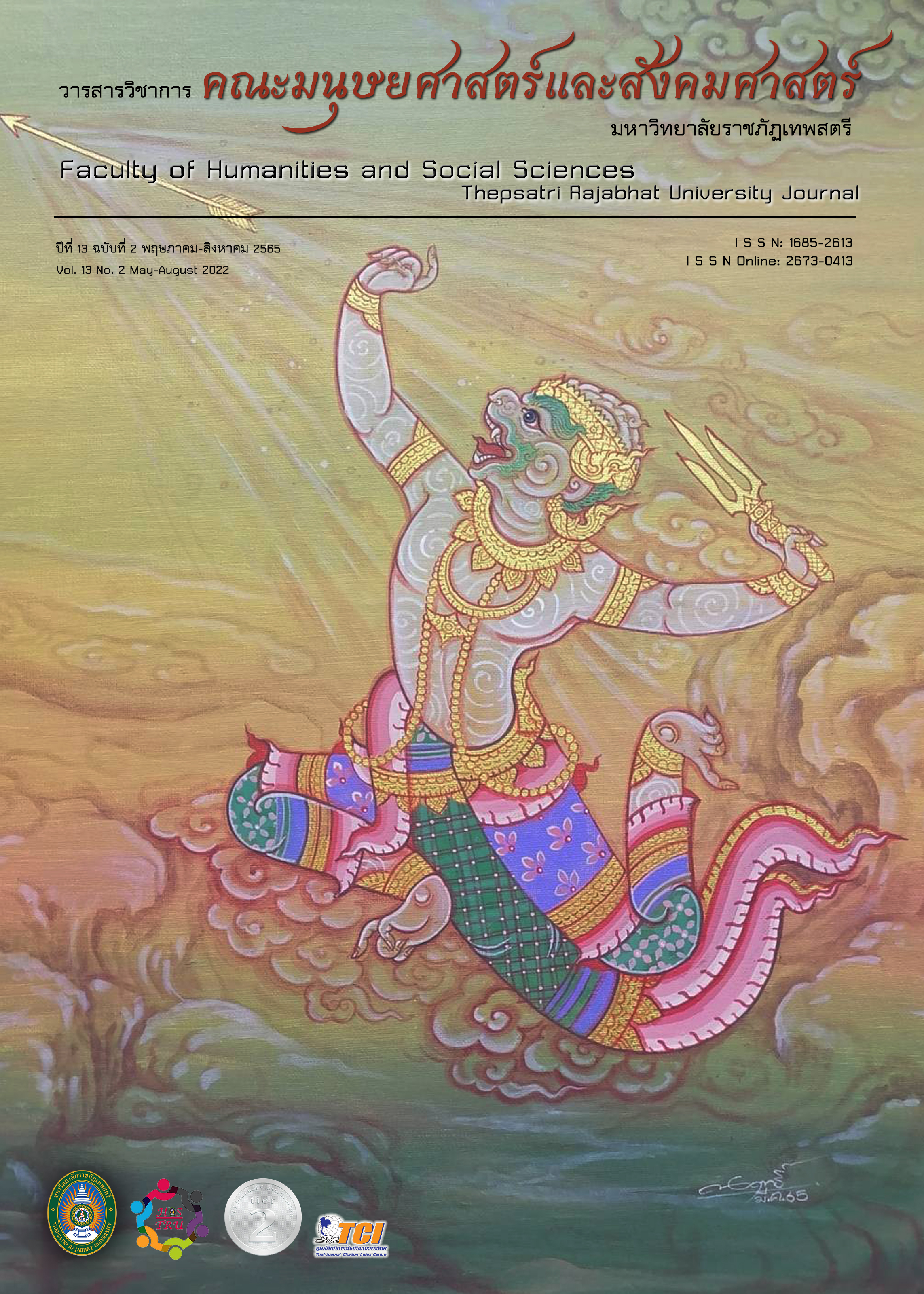Digital Citizens and The Dimensions of Political and Social Engagement
Main Article Content
Abstract
The political and social participation of citizens in the digital age must take into account all dimensions of life, both in the real world and in the virtual world, that connect human beings to interact quickly, resulting in the status of human beings. Membership of society is not limited to citizenship that is divided along the border of each country. Or people who have rights and duties as citizens of a particular country Or people under the same rulership and having the same culture, but expanding the scope to "Digital Citizenship", which must take into account the correct and appropriate norms of behavior when using technology. Therefore, citizens' political and social participation changes according to the context of change, it is necessary to know how to use the Internet's potential for political and social participation. The Internet is both a tool for increasing political participation, such as the use of the Internet to listen to public opinion before legislation. E-Voting or online petition As the above information shows, everything on the Internet. Create a virtual world community Digital technology has become the fifth human factor, allowing humans to enter a new technological paradigm, resulting in a change in human behavior.
Downloads
Article Details

This work is licensed under a Creative Commons Attribution-NonCommercial-NoDerivatives 4.0 International License.
The content and information presented in articles published in the Academic Journal of the Faculty of Humanities and Social Sciences, Thepsatri Rajabhat University, are solely the opinions and responsibilities of the respective authors. The editorial board of the journal neither necessarily agrees with nor assumes any responsibility for such content in any manner whatsoever.
All articles, information, content, and images published in the Academic Journal of the Faculty of Humanities and Social Sciences, Thepsatri Rajabhat University, are the copyright of the journal. Any person or organization wishing to reproduce, disseminate, or otherwise utilize all or any part thereof must obtain prior permission from the Academic Journal of the Faculty of Humanities and Social Sciences, Thepsatri Rajabhat University.
References
กระทรวงศึกษาธิการ. (2551). หลักสูตรแกนกลางการศึกษาขั้นพื้นฐานพุทธศักราช 2551. กรุงเทพมหานคร: กระทรงศึกษาธิการ.
คุณาธิป จำปานิล. (2563, มกราคม - มิถุนายน). แนวทางการสร้างความเป็นพลเมืองดิจิทัลของนักเรียนระดับมัธยมศึกษา. วารสารบริหารการศึกษา มหาวิทยาลัยขอนแก่น, 16(1), 116–127.
ชนิพรรณ จาติเสถียร. (2560). การใช้สื่อเทคโนโลยีสำหรับเด็กปฐมวัย. กรุงเทพมหานคร: สมาคมอนุบาลศึกษาแห่งประเทศไทยในพระบรมราชูปถัมภ์พระบาทสมเด็จพระเทพรัตน์ราชสุดาสยามบรมราชกุมารี.
นลินี ทองประเสริฐ. (2555, กรกฎาคม - ธันวาคม). บทบาทของสังคมออนไลน์ต่อสำนึกทางการเมืองของนิสิตนักศึกษา มหาวิทยาลัยในภาคตะวันออกเฉียงเหนือตอนล่าง. วารสาร มฉก.วิชาการ, 16(31), 65–76.
นิชคุณ ตุวพลางกูร. (2561, มกราคม - เมษายน). การเคลื่อนไหวทางสังคมด้านการเมืองในยุคดิจิทัล: กรณีศึกษาการคัดค้านร่างพระราชบัญญัตินิรโทษกรรม และการต่อต้านระบบซิงเกิลเกตเวย์. วารสารศาสตร์, 11(1), 93–94.
นุกูล ชิ้นฟัก, วรลักษณ์ ลลิตศศิวิมล, อับดุลเราะมัน มอลอ, และสามารถ วราดิศัย. (2562). การใช้สื่อสังคมออนไลน์ในการสื่อสารทางการเมืองและการตัดสินใจเลือกตั้งของนักศึกษาระดับอุดมศึกษาในจังหวัดสงขลา. ใน การประชุมหาดใหญ่วิชาการระดับชาติและนานาชาติ ครั้งที่ 10 วันที่ 12 – 13 กรกฎาคม 2562 (หน้า 921 – 929). สงขลา: มหาวิทยาลัยหาดใหญ่.
ปิยะชาติ อิศรภักดี. (2559). Branding 4.0 (การสร้างชื่อตราผลิตภัณฑ์เครื่องหมายการค้าชื่อการค้า ชื่อตราผลิตภัณฑ์). มหาวิทยาลัยกรุงเทพ: อมรินท์ฮาวทู.
มานิจ สุขสมจิตร. (2558, เมษายน). ความเป็นพลเมืองในระบอบประชาธิปไตย. รัฐธรรมนูญฉบับปฏิรูปเป็นอย่างไร, 1(7), 9 - 14.
รัฐกร ชนะวงศ์. (2563). ประชาธิปไตยดิจิทัลกับการมีส่วนร่วมทางการเมือง. สืบค้น กุมภาพันธ์ 2, 2564, จาก http://www.polsci.tu.ac.th/direk/view.aspx?id=478.
วรพจน์ วงศ์กิจรุ่งเรือง. (2561). คู่มือพลเมืองดิจิทัล. กรุงเทพมหานคร: สำนักงานส่งเสริมเศรษฐกิจดิจิทัล กระทรวงดิจิทัลเพื่อเศรษฐกิจและสังคม.
วรรณากร พรประเสริฐ, เทียมจันทร์ พานิชย์ผลินไชย, ปกรณ์ ประจัญบาน, และน้ำทิพย์ องอาจวาณิชย์. (2563, กรกฎาคม - กันยายน). การพัฒนาแบบวัดและเกณฑ์ปกติความเป็นพลเมืองดิจิทัลของนิสิตนักศึกษาในสถาบันอุดมศึกษา. วารสารศึกษาศาสตร์ มหาวิทยาลัยนเรศวร, 22(3), 217 – 234.
วีระ เลิศสมพร. (2563). ประชาธิปไตยอิเล็กทรอนิกส์: เสริมสร้างหรือฉุดรั้ง. วารสารรัฐศาสตร์และรัฐประศาสนศาสตร์ มหาวิทยาลัยเชียงใหม่, 7(1), 138–160.
สำนักงานเลขาธิการสภาการศึกษา กระทรวงศึกษาธิการ. (2557). แผนแม่บทเทคโนโลยีสารสนเทศและการสื่อสารเพื่อการศึกษา กระทรวงศึกษาธิการ พ.ศ. 2554-2556. กรุงเทพมหานคร: กระทรวงศึกษาธิการ.
โสภิดา วีรกุลเทวัญ. (2561). เท่าทันสื่อ: อำนาจในมือพลเมืองดิจิทัล. กรุงเทพมหานคร: มูลนิธิส่งเสริมสื่อเด็กและเยาวชน สถาบันสื่อเด็กและเยาวชน.
อนุรัตน์ อนันทนาธร, เอกวิทย์ มณีธร, และธีระ กุลสวัสดิ์. (2555, พฤษภาคม - สิงหาคม). แบบจำลองความรู้ความเข้าใจทางการเมือง ความโน้มเอียงทางการเมืองและการมีส่วนร่วมทางการเมืองของนักศึกษา สถาบันการศึกษาในเขตพื้นที่ภาคตะวันออกของประเทศไทย. วารสารการเมือง การบริหาร และกฎหมาย, 4(2), 233–258.
อุมาภรณ์ บุพไชย. (2561, พฤษภาคม - สิงหาคม). การพัฒนาสู่เมืองอัจฉริยะ: บทบาทของสื่อออนไลน์ในการประสานการมีส่วนร่วมในงานผังเมือง. Veridian E-Journal Silpakorn University, 11(2), 3113 – 3130.
เอกชัย กี่สุขพันธ์. (2559). การบริหารสถานศึกษายุคดิจิทัล (School Management in Digital Era). สืบค้นเมื่อ กุมภาพันธ์ 12, 2564, จาก https://www.trueplookpanya.com/knowledge/ content/52232/-edu-teaartedu-teaart-teaartdir.
Gerodimos, R. (2005, November - December). Democracy and the Internet: Access, Engagement and Deliberation. Systematics, Cybernatics and Informatics, 3(6), 26-31.
Hale, M., Musso, J., & Weare, C. (1999). Developing Digital Democracy: Evidence form Californaian Municipal Web Pages. In B.N. Hague & B.D.Loader (Eds.), Digital Democracy: Discourse and Decision Making in The Information Age. London: Routledge.
International Society for Technology in Education. (2016). Digital Citizenship. Retrieved February, 2021, from https://www.iste.org/learn/digital-citizenship.
Kenneth L. Hacker., & Dijk, J.V. (2000). Digital Democracy Issues of Theory and Practice. London: SAGE Publications.
Mouffe, C. (2005). On the Political. Abingdon: Routledge.
Netsafe New Zealand. (2015). Digital Citizenship on New Zealand School; Overview. Retrieved February 12, 2021, from https://netsafe.org.nz/wp-content/uploads/2015/09/Digital_Citizenship_in_New_Zealand_Schools_Overview.pdf.
Papacharissi, Z. A. (2010). A Private Sphere: Democracy in a Digital Age. London: Cambridge Polity Press.
Ribble. (2011). Digital Citizenship in School (2nd Ed). Eugene, Oregon: The International Society for Technology in Education.
Rogow. (2002). ABCs of Media Literacy: What Can Pre-Schooolers Learn?. Retrieved February 2, 2021, from http://www.medialit.org/reading-room/abcs-media-literacy-what-can-pre-schooolers-learn.
Single Gateway. (2558). แจงแค่ศึกษา “ซิงเกิล เกตเวย์”. Retrieved February 12, 2021, from https://thaipublica.org/jabted_issue/%E0%B9%81%E0%B8%88%E0%B8%87%E0%B9%81%E0%B8%84%E0%B9%88%E0%B8%A8%E0%B8%B6%E0%B8%81%E0%B8%A9%E0%B8%B2-%E0%B8%8B%E0%B8%B4%E0%B8%87%E0%B9%80%E0%B8%81%E0%B8%B4%E0%B8%A5-%E0%B9%80%E0%B8%81%E0%B8%95/.
Winston, D. (2004). Digital Democracy and the New Age of Reason. in Henry Jenkins and David Thorburn (eds.), Democracy and New Media, Cambridge: MIT Press.


